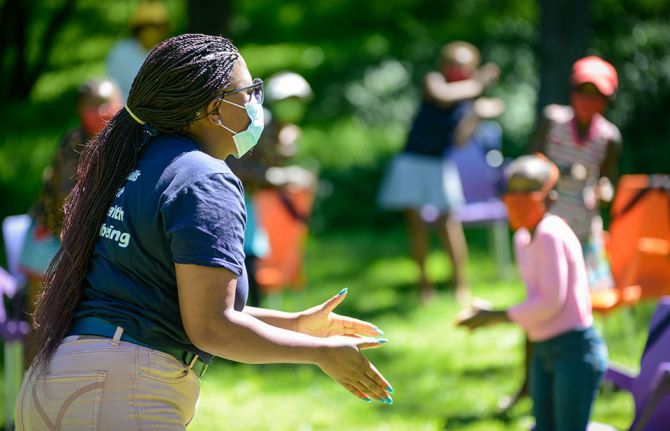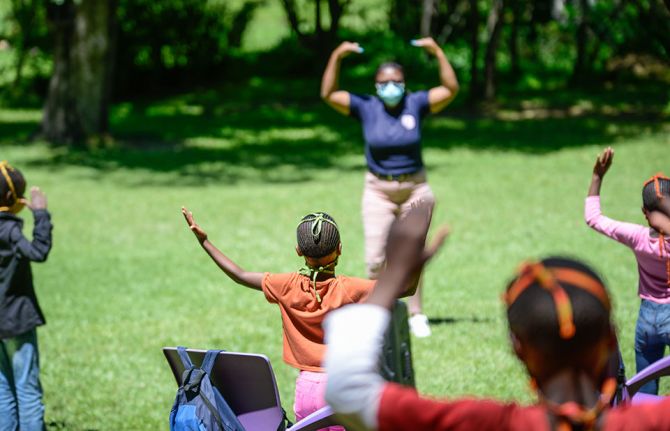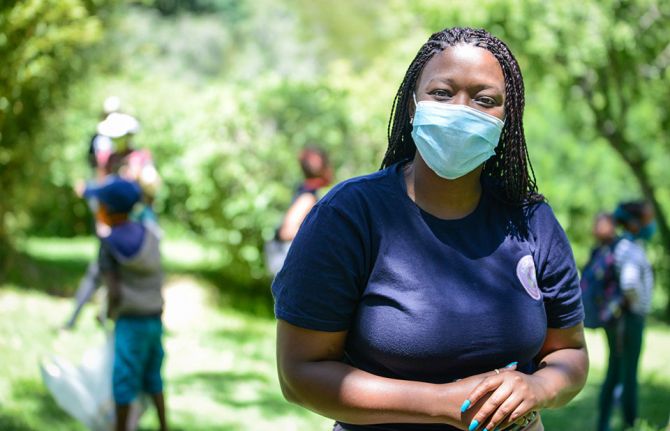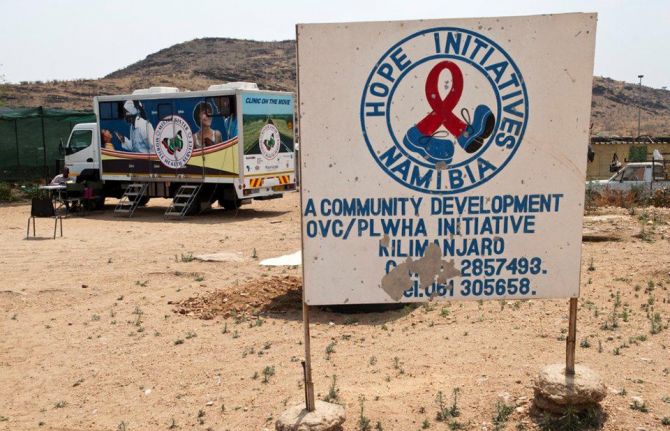



Feature Story
HIV community activists tackle COVID-19 in Lesotho
02 December 2020
02 December 2020 02 December 2020It is a sunny weekday morning in the small town of Morija, Lesotho. On the expansive lawn of the Morija Museum and Archives, under the shade of tall trees, a group of children and teenagers sit on evenly spaced plastic chairs.
They have all had their temperatures checked, have washed their hands at purpose-built tippy-taps and are wearing brightly coloured seshoeshoe fabric face masks.
The learners would usually be in school at this time, but schools throughout the country remain closed due to COVID-19. In response to this crisis, local community-based organizations have had to implement new and innovative programming.
This particular programme is called Skills & Soup, implemented by the Hub, a Morija-based nongovernmental organization. On a bi-weekly basis, groups of learners visit to receive a nutritious meal and participate in a range of activities and educational programming, including dance and taekwondo, maths and science lessons and COVID-19 awareness sessions.
Today, the Hub is hosting a pair of guest facilitators from the Maseru-based nongovernmental organization Kick4Life, which specializes in delivering HIV and life skills education through sports-based curricula.
Puky Ramokoatsi, an experienced educator and gender equality activist, is leading the session with confidence and ease. She begins with an energizer, getting the learners to stand up to chant and dance along with her, all the while remaining at a two-metre distance from one another. She keeps her mask on throughout the session, the volume and authority of her voice unhindered.
During the session, Ms Ramokoatsi and her co-facilitator, Mbulelo Mochochoko, play a series of sound clips from a portable speaker. The clips, taken from new animations developed by Kick4Life, feature catchy music and short conversations between two characters who discuss a range of health-related topics, including HIV, nutrition, mental health and ways to protect oneself against COVID-19.
“Who can remind me which fluids can transmit HIV?” asks Ms Ramokoatsi after one of the clips has played. The children stand up and stretch their hands out eagerly, competing to be the first to give the correct answer.
The session is a far cry from Kick4Life’s signature programming, which typically includes close-contact games and activities, with children huddled in groups for discussions or holding hands while standing in a circle.
As with community-based organizations across the region, Kick4Life has adapted its approach to HIV and health education to mitigate the risk of COVID-19 transmission and in response to national lockdowns and government-mandated restrictions.
“We were forced to close our offices in March, when Lesotho went into lockdown, so we had to quickly adjust,” Ms Ramokoatsi explains. “We partnered with the British High Commission in Lesotho to adapt our curriculum into six short animations which could be easily distributed through our online platforms and to include new messaging about COVID-19. We also aired the sound clips from these animations on national radio stations. These are some of the ways that we continued to engage with young people even during the lockdown.”
While COVID-19 cases remain relatively low in Lesotho, at just over 2000 cumulative cases as of November 2020, testing capacity is also low. Only 25 500 tests have been conducted since March 2020. By comparison, a neighbouring country, South Africa, has conducted more tests than this in one day.
In 2019, there were 340 000 people living with HIV in Lesotho, 120 000 of whom are not on HIV treatment.
In addition, a third and silent epidemic plagues Lesotho—that of sexual and gender-based violence. It is estimated that one in three women in Lesotho have experience sexual or physical violence in their life—the same as the global average.
Ms Ramokoatsi has been involved with Kick4Life since 2010, when she began to participate in the organization’s programmes because of her love for football. At the time, she knew very little about HIV, and her interest in the issue was piqued by the fact that her aunt had recently died of AIDS-related illnesses.
“I didn’t understand enough about HIV when my aunt was sick,” recalls Ms Ramokoatsi. “I judged her negatively and didn’t support her. When I learnt more about HIV, I realized how wrong I had been. I made it my purpose after that to support people living with HIV, to give others the support that I hadn’t given my aunt.”
Having experienced sexual abuse herself, Ms Ramokoatsi is acutely aware of the healing power of sports and education and reflects on the difficult transition from face-to-face learning and close-contact activities to virtual and socially distanced programming.
“Before COVID-19 we were in the process of helping several young women who had experienced sexual violence and were slowly opening up to us after taking part in our programmes,” Ms Ramokoatsi explains. “When we were forced to close, we lost touch with some of them. We’ve had to find ways to continue with our programmes and to keep reaching out to our participants, but it hasn’t been easy.”
Ms Ramokoatsi emphasizes the importance of organizations working together in their responses to COVID-19 awareness and health education. “Today, for example, we’re delivering this session thanks to our partnerships,” she says. “I hope more organizations can work like this to share resources and information.”
“I always say that the best part of the game is the opportunity to play. That attitude applies to everything: instead of sitting on the sidelines, get involved. Learn about the situation or the issues around you, whether it’s HIV or gender-based violence or COVID-19. Learn how you can adapt, how you can take care of yourself, and then find a way to help others,” she says.


